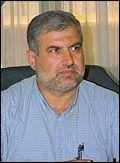 |
| Vol. 1 No. 11 | November 1999 |
Two top officials of Hezbollah strongly hinted this month that the struggle with Israel will continue after the withdrawal of Israeli forces from south Lebanon.
 |
| Mohammed Raad |
Similar sentiments were expressed by Sheik Na'im Kassem, the deputy leader of Hezbollah, in an interview with the Arabic weekly weekly al-Majalla. In the absence of an agreement with Syria, a unilateral Israeli withdrawal would leave "the picture confused and the results unknown in their details," said Kassem. "Developments could occur that would render such a withdrawal full of negative factors for Israel," he added ominously.
Hezbollah's threats to escalate operations in the wake of an Israel withdrawal are open to two possible interpretations. Most informed sources attribute these threats to the group's subservience to Syria, which has a clear interest in prolonging the occupation until the advent of face-to-face negotiations between Damascus and Tel Aviv. With an eye toward next year's parliamentary elections, Hezbollah officials will presumably take special care not to alienate Syria--the main power broker in Lebanese electoral politics. All allies of Syria, including Lebanese President Emile Lahoud, have strictly observed the principle that "the road to security for northern Israel lies through Damascus" in public statements. In fact, they habitually compete with each other in expressing these sentiments in the strongest possible terms. Shortly after Raad's speech, the pro-Syrian speaker of Lebanon's parliament, Nabih Berri, declared that a unilateral Israeli withdrawal "doesn't mean peace and a withdrawal doesn't mean that Lebanon will guard Israel's border."
On the other hand, Hezbollah officials have stopped short of promising an end to the attacks once Israel and Syria reach a peace settlement. While Raad and other members of Hezbollah's political wing may be willing to end the conflict at the behest of Syria, ideologues within Hezbollah are much more interested in preserving close relations with the religious establishment in Teheran, which has little interest in the peace process.
� 1999 Middle East Intelligence Bulletin. All rights reserved.